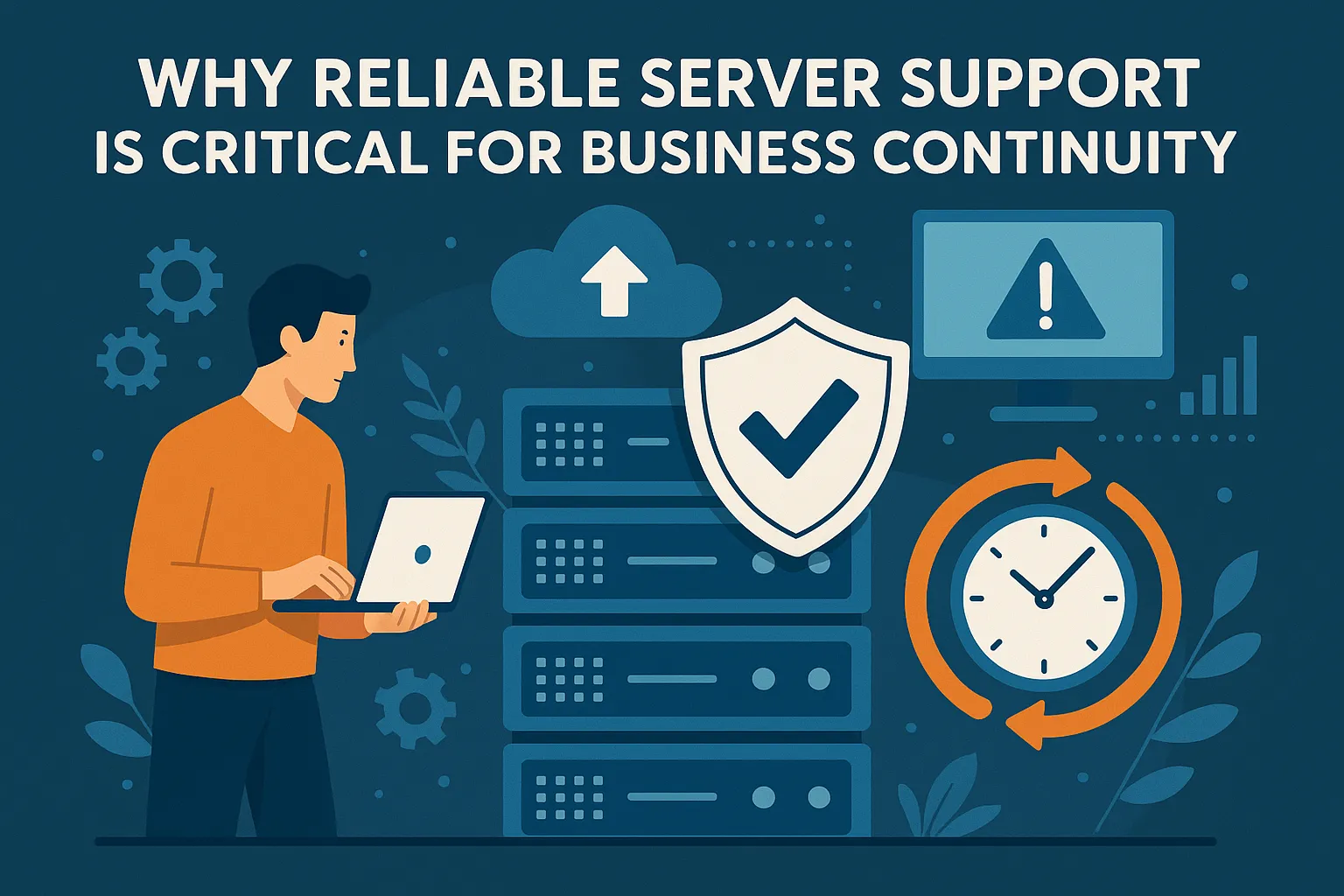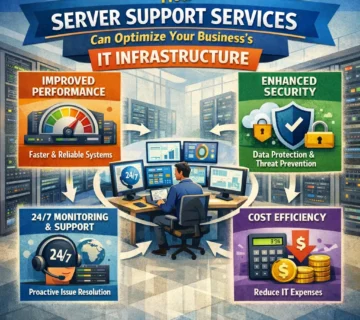Why Reliable Server Support Is Critical for Business Continuity

In today’s digital-driven business landscape, almost every organization—regardless of size or industry—relies on technology to deliver services efficiently. At the core of that technology lies one essential component: the server. Whether your business uses on-premises servers, cloud servers, or a hybrid infrastructure, server reliability is the backbone of smooth operations. When servers fail, everything from communication to customer service to revenue generation is at risk.
This is why reliable server support is not just a technical necessity; it is a strategic pillar of business continuity. Without dependable server monitoring, maintenance, and rapid troubleshooting, even a minor issue can escalate into a major business disruption.
Below, we break down exactly why dependable server support is critical for keeping your business running, your employees productive, and your customers satisfied.
1. Preventing Costly Downtime
Downtime is one of the most expensive problems a business can face. According to industry research, even a single hour of downtime can cost thousands of dollars—sometimes hundreds of thousands for large companies. But financial cost is only one part of the equation. Downtime affects:
-
Employee productivity
-
Customer trust and satisfaction
-
Internal operations
-
Deadlines and deliverables
-
Brand reputation
Reliable server support drastically reduces downtime through proactive monitoring and real-time issue detection. Skilled technicians can spot anomalies—such as resource spikes, failing hardware, or suspicious activity—before they turn into outages. By addressing issues early, businesses avoid the operational chaos and financial losses that come with unexpected server failures.
2. Protecting Data and Strengthening Security
In a world where cyberattacks are increasing in frequency and sophistication, server security is more important than ever. Servers store sensitive data, customer information, business applications, and mission-critical resources. Any breach can disrupt operations or halt them entirely.
Reliable server support provides continuous security through:
-
Regular patching and updates
-
Firewall configuration
-
Intrusion detection and prevention
-
Data encryption
-
Access control management
-
Security audits and risk assessments
When your servers are properly protected, your business is less vulnerable to ransomware, data breaches, and internal threats. This directly supports business continuity by ensuring operations remain safe, secure, and uninterrupted.
3. Ensuring Quick Recovery with Backup & Disaster Recovery Solutions
Even with strong prevention in place, unexpected events—like power outages, natural disasters, hardware failures, or human error—can still disrupt server operations. Without a solid backup and disaster recovery plan, businesses can lose critical data and face lengthy downtime.
Reliable server support ensures:
-
Automated, regular server backups
-
Secure off-site or cloud storage
-
Fast data restoration
-
Redundant systems for failover
-
Tested disaster recovery procedures
These measures ensure that even if the worst happens, your business can recover quickly. Instead of days or weeks of downtime, operations can resume within minutes or hours. This level of resilience is essential for business continuity planning.
4. Supporting Remote & Hybrid Workforces
Remote and hybrid work models depend heavily on servers. Employees need constant access to:
-
Shared files
-
Business applications
-
Virtual desktops
-
Collaboration tools
-
Company databases
Any disruption in server performance can severely impact remote productivity.
Reliable server support ensures:
-
Secure remote access
-
Fast, stable server performance
-
Cloud server optimization
-
VPN configuration and monitoring
-
Data synchronization across devices
With dependable server support, remote employees can work seamlessly from anywhere—maintaining productivity and supporting continuous operations.
5. Enhancing System Performance and Scalability
Reliable server support does more than keep systems online; it ensures they operate efficiently. Servers that are poorly maintained often experience:
-
Slow response times
-
Frozen applications
-
Poor network performance
-
Storage limitations
-
Overloaded resources
This impacts employees, customers, and overall business workflow.
A professional server support team regularly optimizes servers through:
-
Resource balancing
-
Performance tuning
-
Hardware/firmware updates
-
Cleanups and optimization
-
Real-time monitoring
These improvements prevent performance bottlenecks and ensure your servers can scale as your business grows. Whether you add more employees, open a new office, or expand your service offerings, reliable server support ensures your IT infrastructure grows with you.
6. Boosting Employee Productivity and Morale
Technical issues are one of the biggest sources of employee frustration. Slow servers, login problems, and system crashes can derail productivity and create unnecessary stress.
Reliable server support eliminates these challenges by ensuring:
-
Faster load times
-
Fewer technical interruptions
-
Quick resolution of support tickets
-
Seamless application access
-
Up-to-date software
When employees have reliable technology, they can work more efficiently and feel more confident in their ability to perform daily tasks. This directly contributes to higher morale and stronger overall performance.
7. Improving Customer Experience and Trust
Customers expect efficient, reliable service—and servers play a huge role in delivering that experience. If your website goes down, customer portals crash, or communication systems fail, customers may quickly lose trust and turn to competitors.
Reliable server support ensures:
-
Fast website performance
-
Reliable online platforms
-
Consistent communication systems
-
Secure customer data
-
Minimal service disruptions
Satisfied customers are loyal customers. Reliable servers help maintain the level of service your customers expect.
8. Reducing Long-Term IT Costs
Some businesses skip professional server support to “save money,” but this often leads to far higher long-term costs due to:
-
Emergency repairs
-
Data loss
-
Ransomware payments
-
Lost revenue during downtime
-
Premature hardware failure
-
Reduced employee productivity
Reliable server support takes a preventative approach, reducing the need for costly emergency fixes. Regular maintenance, performance tuning, and monitoring extend the life of your servers and reduce unexpected expenses.
9. Enabling Strategic Focus for the Business
When server issues constantly disrupt operations, leadership and employees waste time troubleshooting instead of focusing on strategic goals. Reliable server support allows your team to:
-
Concentrate on growth
-
Improve internal processes
-
Enhance customer service
-
Focus on innovation
-
Execute long-term planning
With a stable IT environment, your business can operate smoothly and stay focused on what matters most—growth and success.
Conclusion
Reliable server support is an essential component of business continuity. It ensures stability, improves performance, enhances security, and keeps your operations running smoothly—no matter what challenges arise. From protecting valuable data to supporting remote workers to preventing costly downtime, dependable server support helps businesses think beyond survival and move toward long-term resilience and success.
In an increasingly digital world, a reliable server environment isn’t optional—it’s a competitive advantage.







No comment